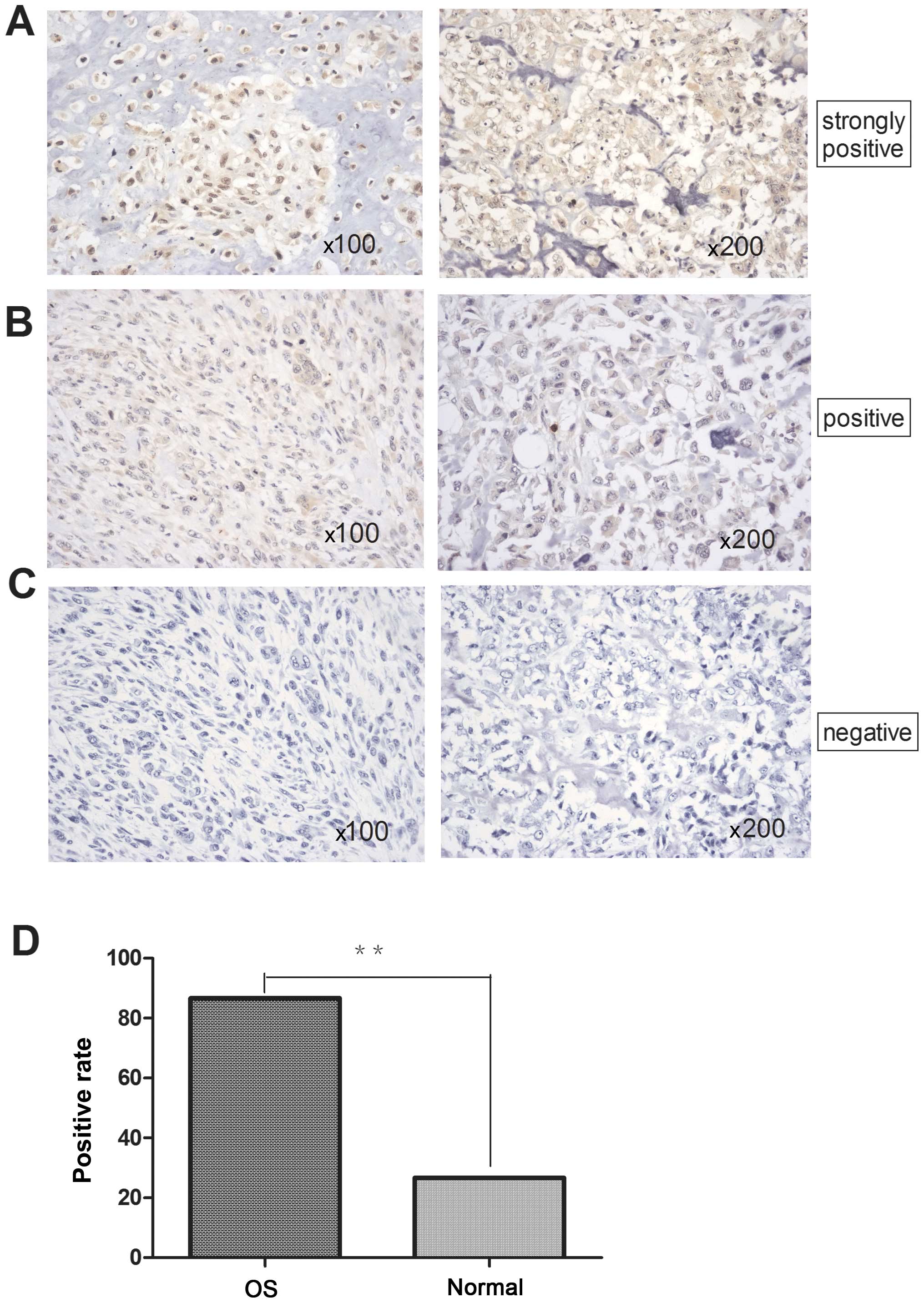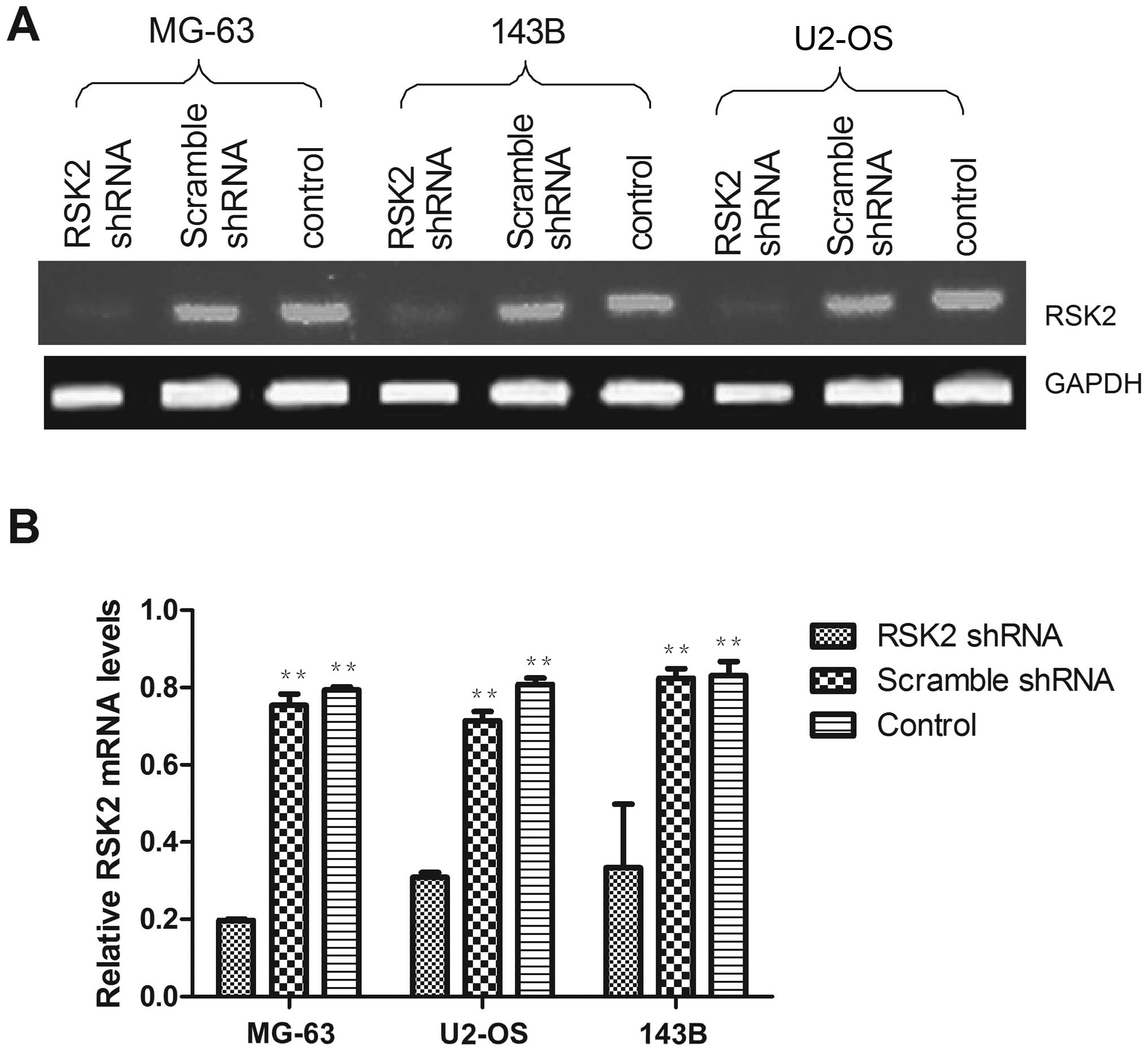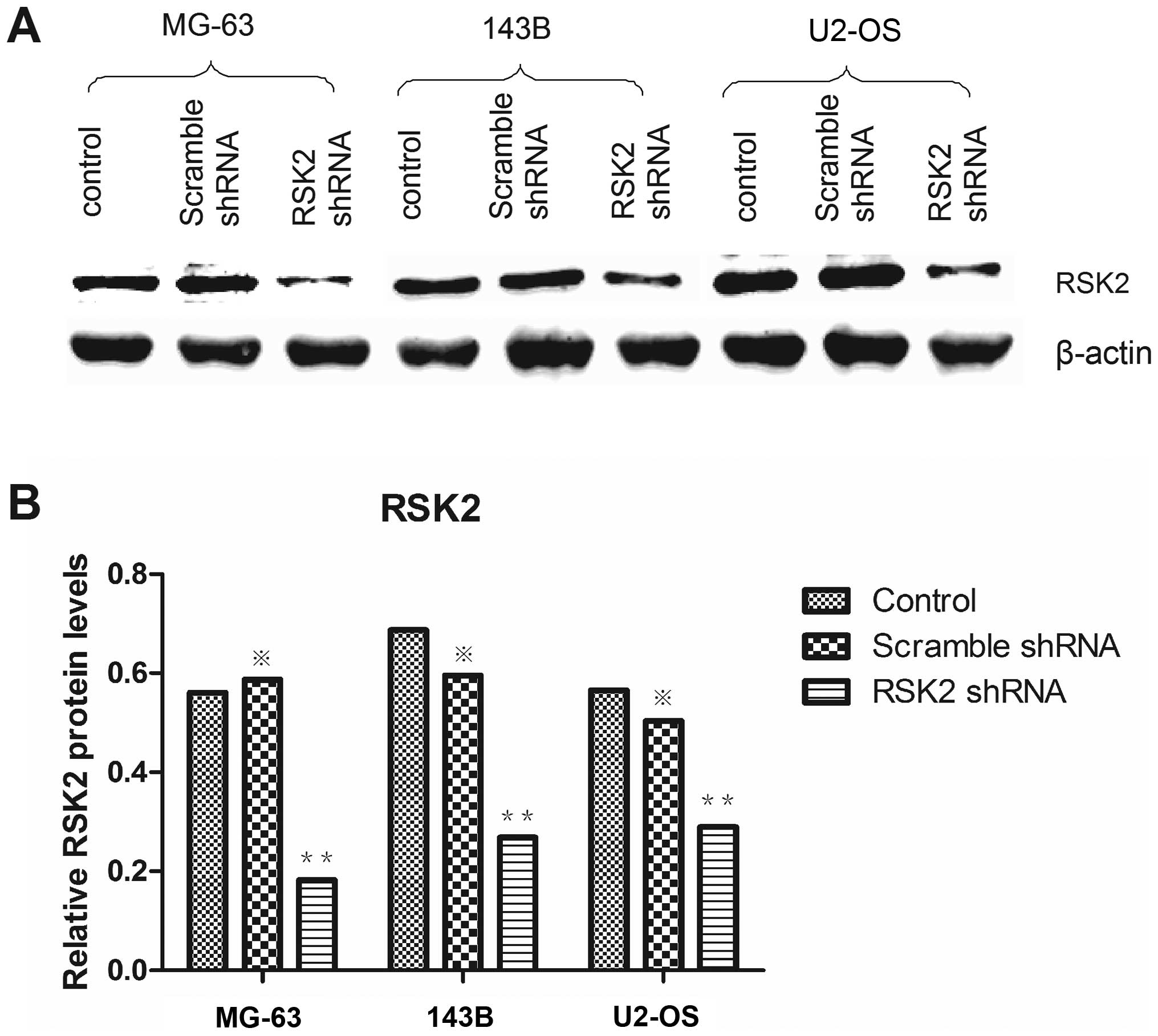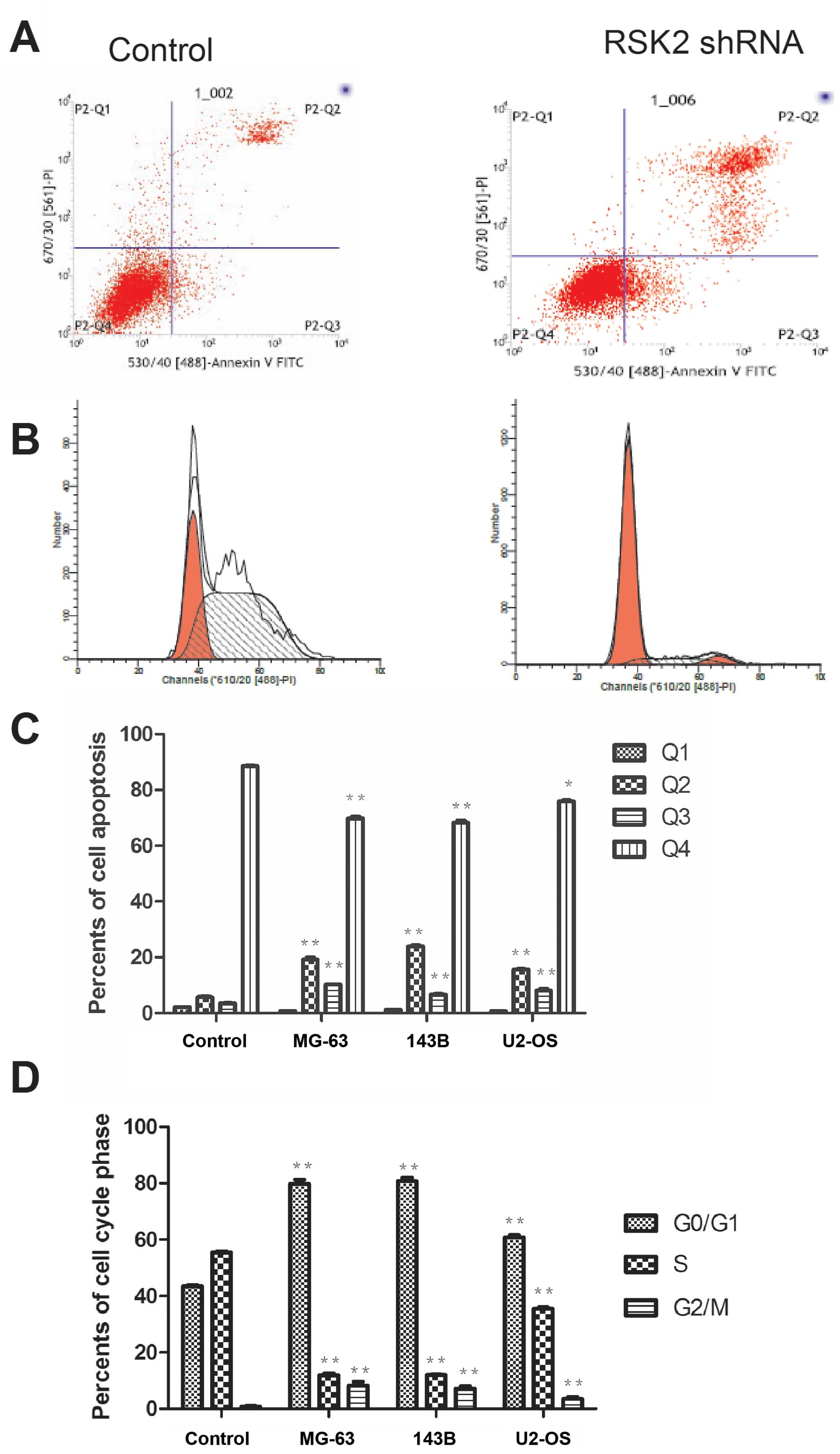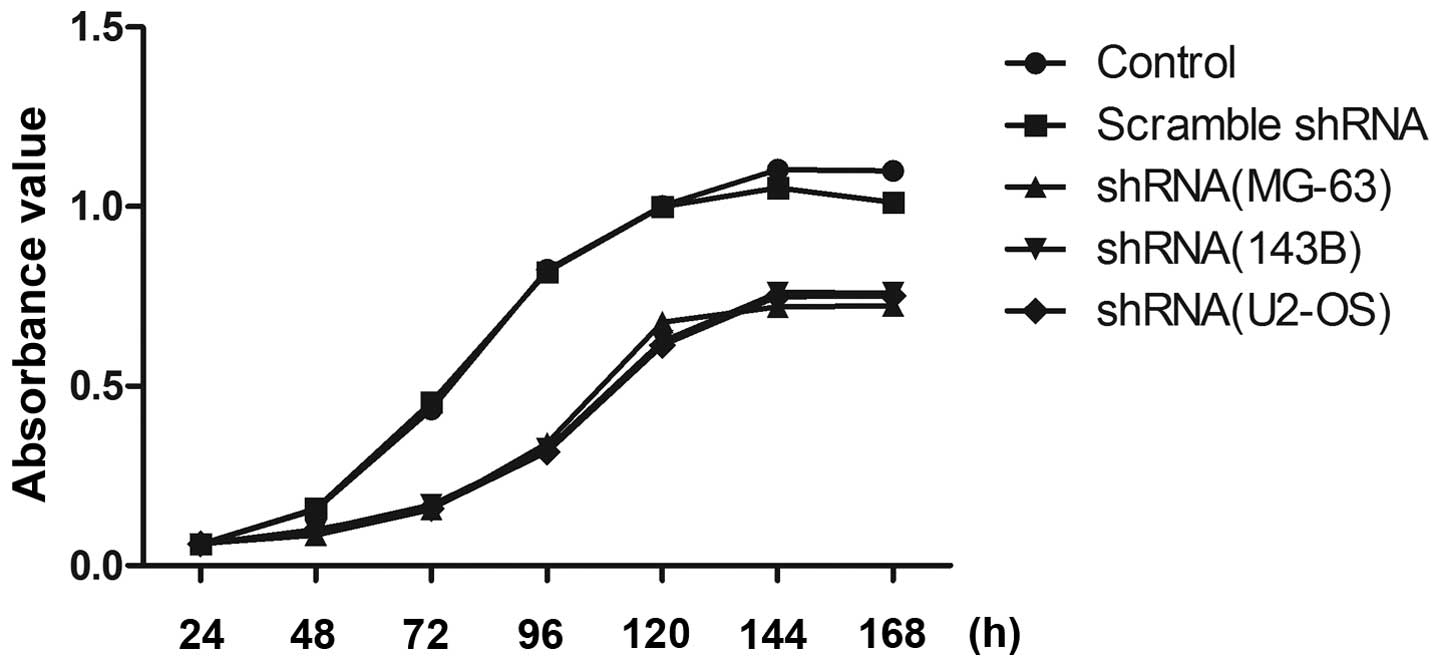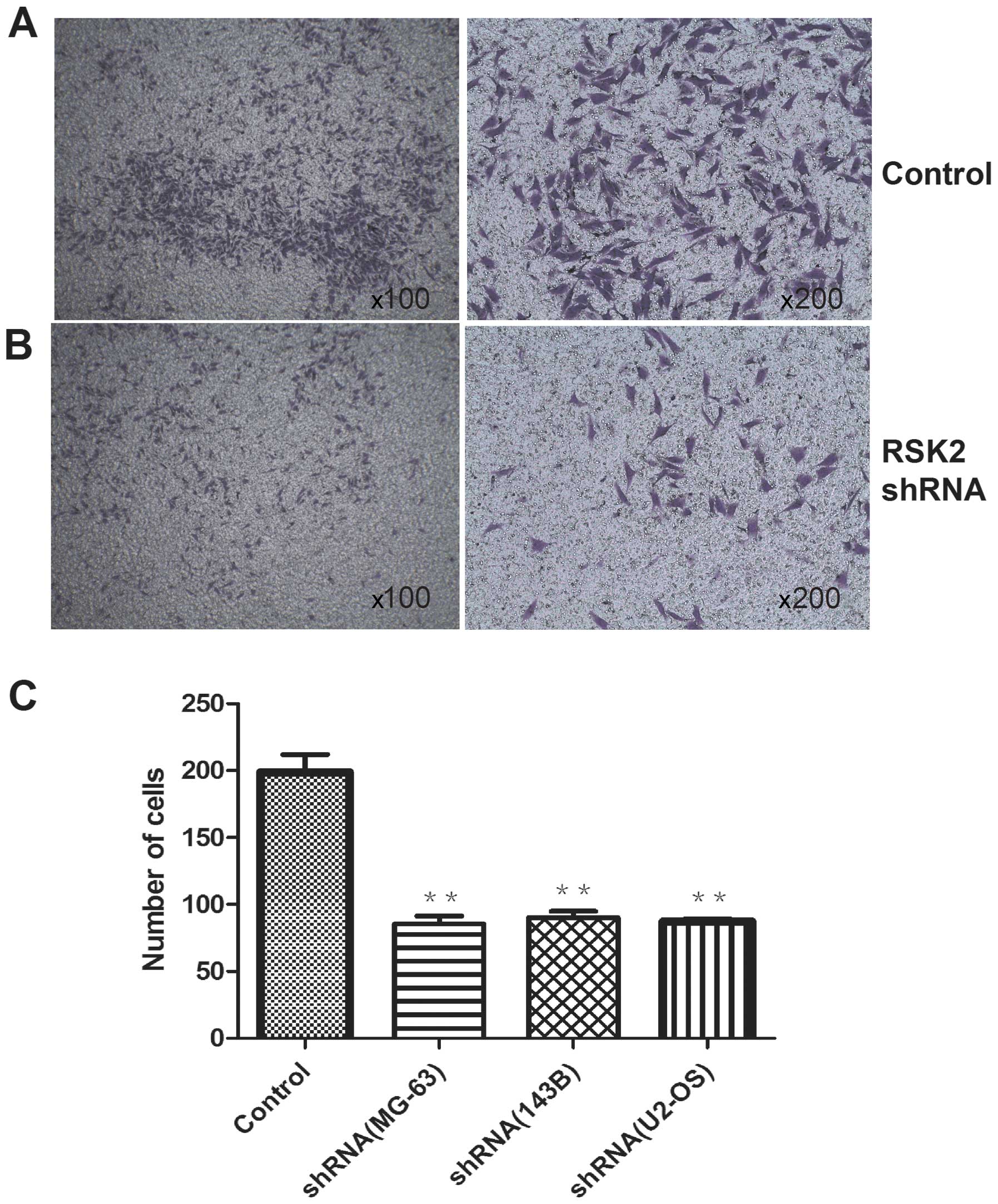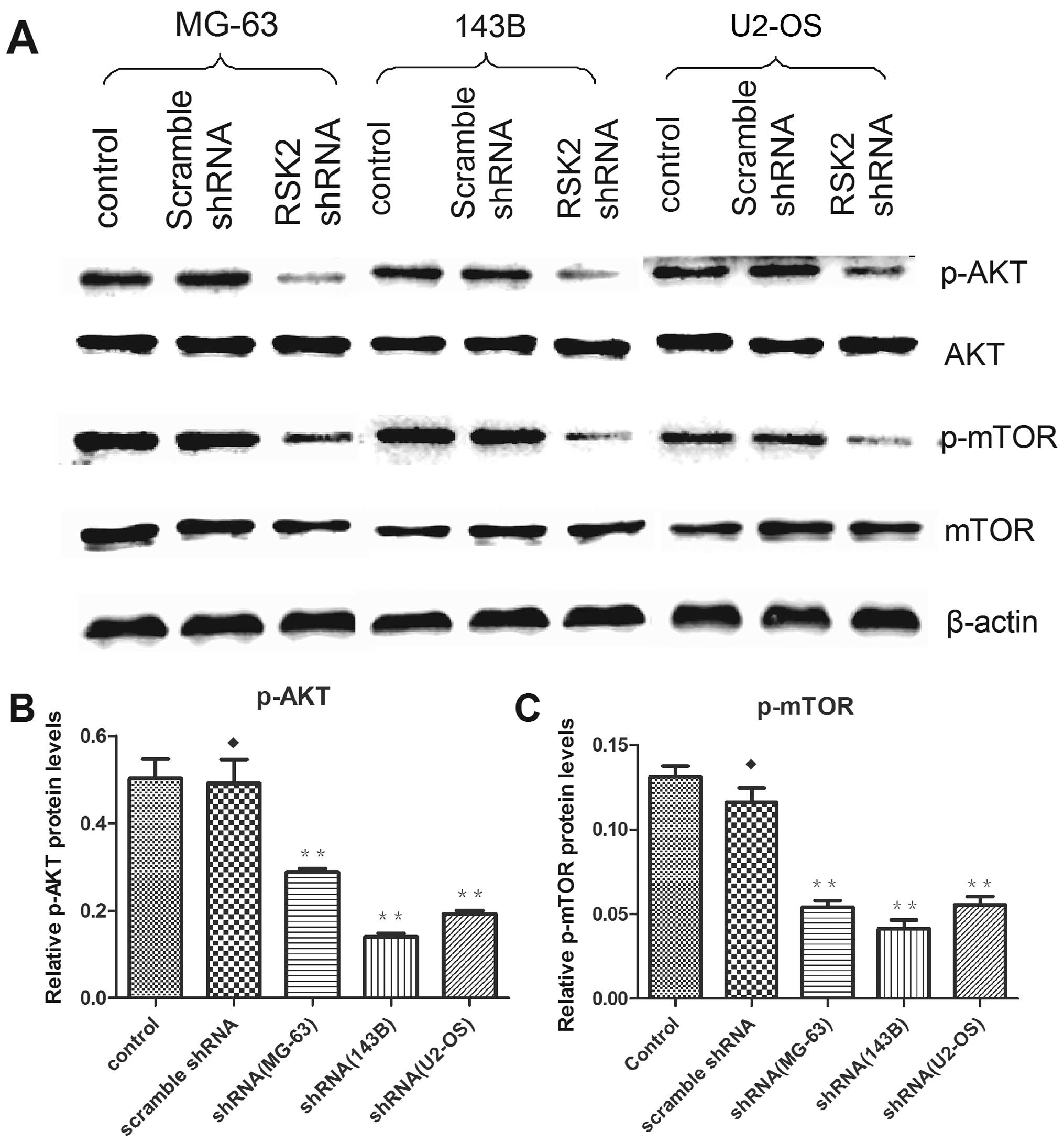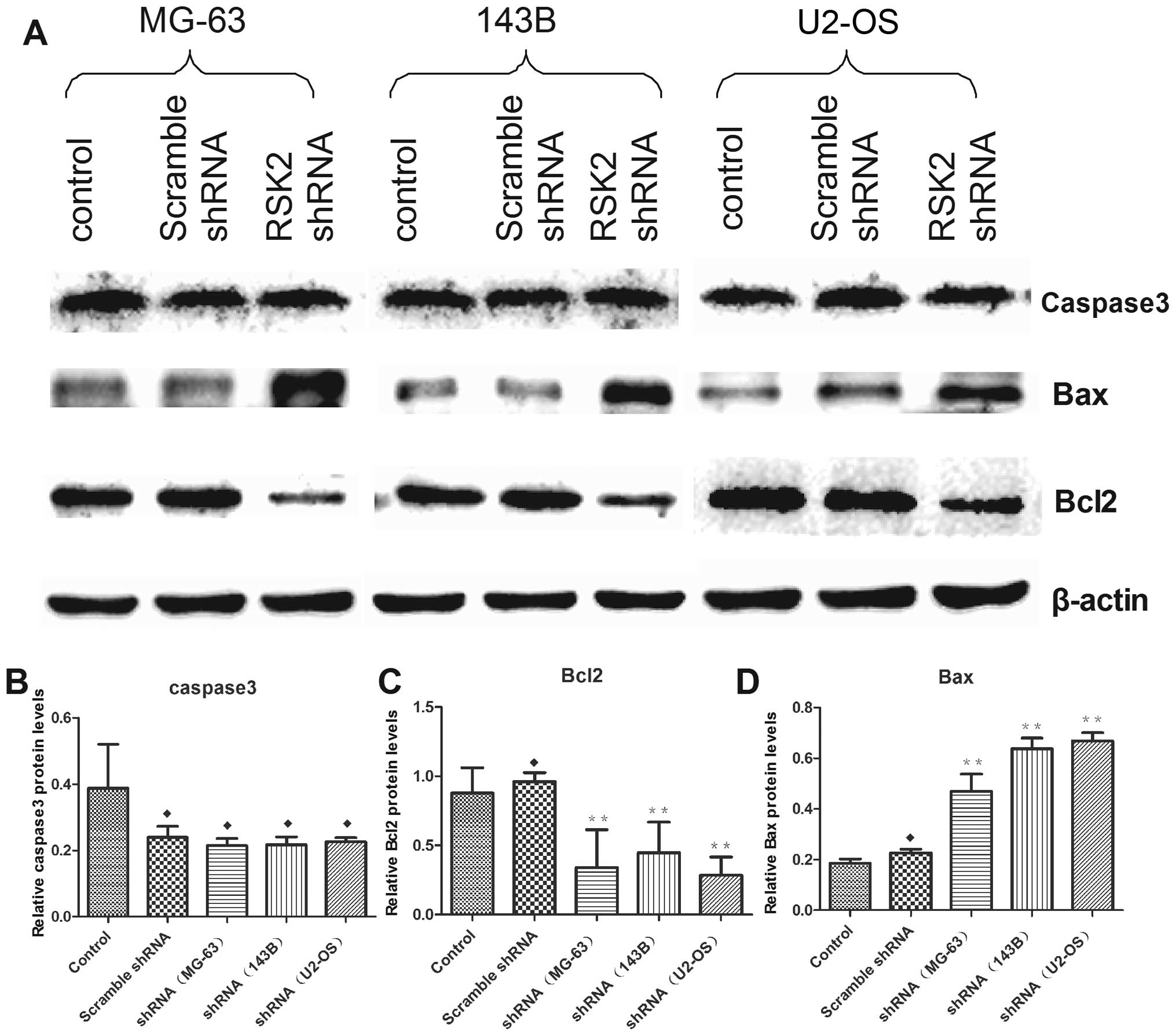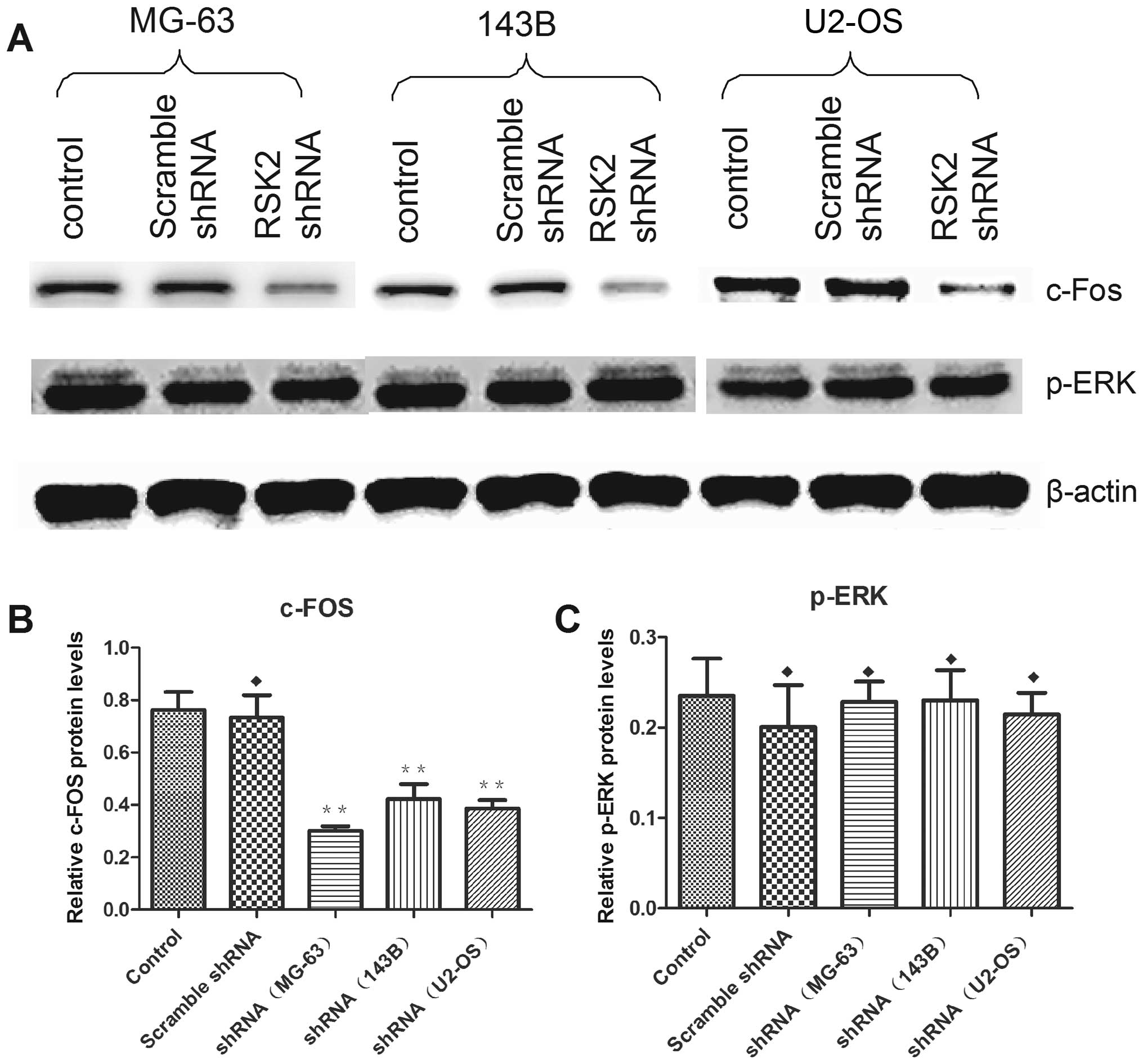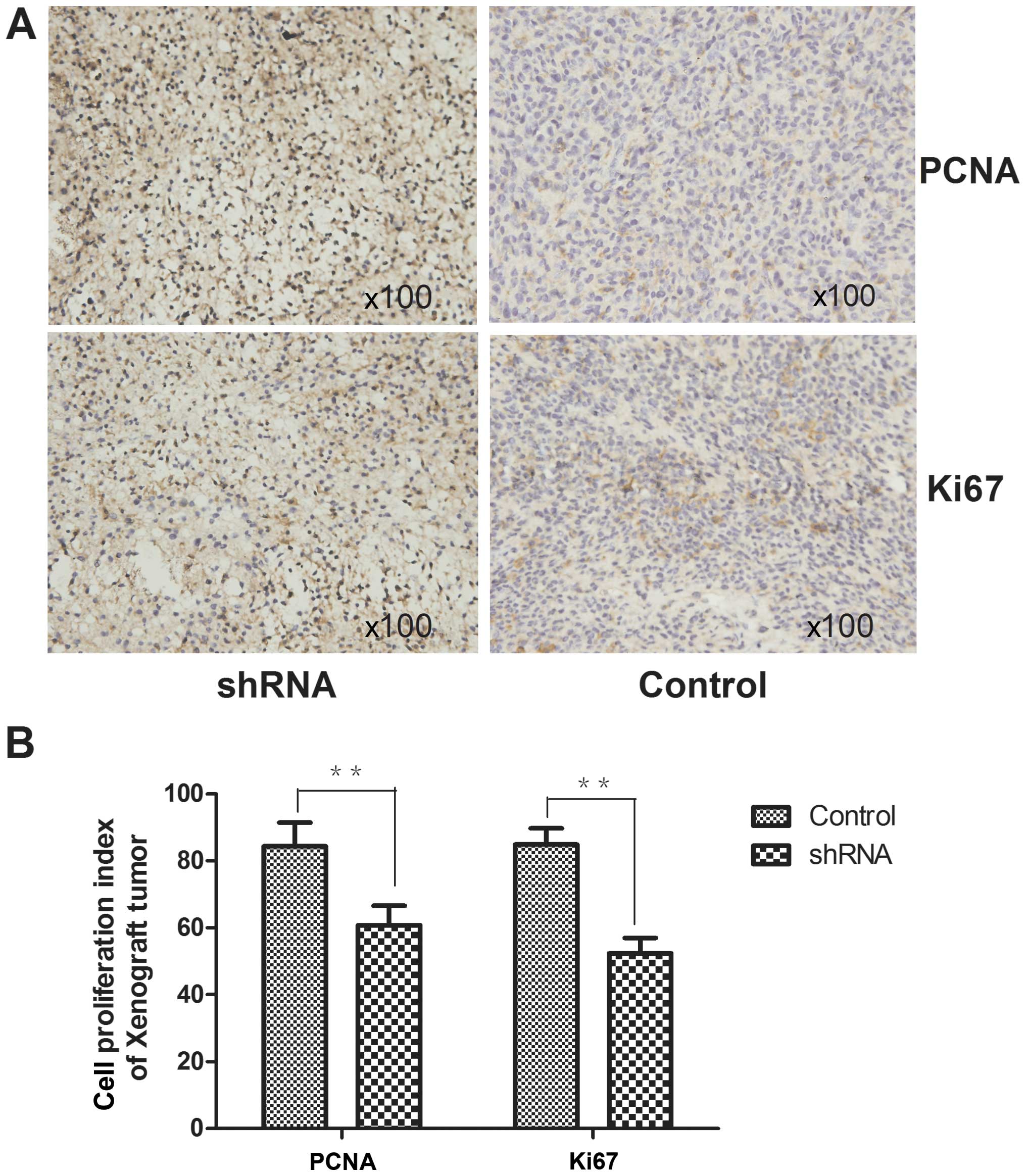|
1
|
Ottaviani G and Jaffe N: The epidemiology
of osteosarcoma. Cancer Treat Res. 152:3–13. 2009. View Article : Google Scholar
|
|
2
|
Sztán M, Pápai Z, Szendrôi M, Looij M and
Oláh E: Allelic losses from chromosome 17 in human osteosarcomas.
Pathol Oncol Res. 3:115–120. 1997. View Article : Google Scholar : PubMed/NCBI
|
|
3
|
Dahlin DC: Pathology of osteosarcoma. Clin
Orthop Relat Res. 111:23–32. 1975. View Article : Google Scholar : PubMed/NCBI
|
|
4
|
Erikson E and Maller JL: A protein kinase
from Xenopus eggs specific for ribosomal protein S6. Proc Natl Acad
Sci USA. 82:742–746. 1985. View Article : Google Scholar : PubMed/NCBI
|
|
5
|
Dalby KN, Morrice N, Caudwell FB, Avruch J
and Cohen P: Identification of regulatory phosphorylation sites in
mitogen-activated protein kinase (MAPK)-activated protein
kinase-1a/p90rsk that are inducible by MAPK. J Biol Chem.
273:1496–1505. 1998. View Article : Google Scholar : PubMed/NCBI
|
|
6
|
Frödin M, Jensen CJ, Merienne K and
Gammeltoft S: A phosphoserine regulated docking site in the protein
kinase RSK2 that recruits and activates PDK1. EMBO J. 19:2924–2934.
2000. View Article : Google Scholar
|
|
7
|
Blenis J, Chung J, Erikson E, Alcorta DA
and Erikson RL: Distinct mechanisms for the activation of the RSK
kinases/MAP2 kinase/pp90rsk and pp70-S6 kinase signaling systems
are indicated by inhibition of protein synthesis. Cell Growth
Differ. 2:279–285. 1991.PubMed/NCBI
|
|
8
|
Anjum R and Blenis J: The RSK family of
kinases: Emerging roles in cellular signalling. Nat Rev Mol Cell
Biol. 9:747–758. 2008. View
Article : Google Scholar : PubMed/NCBI
|
|
9
|
Smith JA, Poteet-Smith CE, Xu Y, Errington
TM, Hecht SM and Lannigan DA: Identification of the first specific
inhibitor of p90 ribosomal S6 kinase (RSK) reveals an unexpected
role for RSK in cancer cell proliferation. Cancer Res.
65:1027–1034. 2005.PubMed/NCBI
|
|
10
|
Clark DE, Errington TM, Smith JA, Frierson
HF Jr, Weber MJ and Lannigan DA: The serine/threonine protein
kinase, p90 ribosomal S6 kinase, is an important regulator of
prostate cancer cell proliferation. Cancer Res. 65:3108–3116.
2005.PubMed/NCBI
|
|
11
|
Cho YY, Yao K, Kim HG, Kang BS, Zheng D,
Bode AM and Dong Z: Ribosomal S6 kinase 2 is a key regulator in
tumor promoter induced cell transformation. Cancer Res.
67:8104–8112. 2007. View Article : Google Scholar : PubMed/NCBI
|
|
12
|
Kang S, Dong S, Gu TL, Guo A, Cohen MS,
Lonial S, Khoury HJ, Fabbro D, Gilliland DG, Bergsagel PL, et al:
FGFR3 activates RSK2 to mediate hematopoietic transformation
through tyrosine phosphorylation of RSK2 and activation of the
MEK/ERK pathway. Cancer Cell. 12:201–214. 2007. View Article : Google Scholar : PubMed/NCBI
|
|
13
|
Woo MS, Ohta Y, Rabinovitz I, Stossel TP
and Blenis J: Ribosomal S6 kinase (RSK) regulates phosphorylation
of filamin A on an important regulatory site. Mol Cell Biol.
24:3025–3035. 2004. View Article : Google Scholar : PubMed/NCBI
|
|
14
|
Cohen P and Frame S: The renaissance of
GSK3. Nat Rev Mol Cell Biol. 2:769–776. 2001. View Article : Google Scholar : PubMed/NCBI
|
|
15
|
Sutherland C, Leighton IA and Cohen P:
Inactivation of glycogen synthase kinase-3 beta by phosphorylation:
New kinase connections in insulin and growth-factor signalling.
Biochem J. 296:15–19. 1993. View Article : Google Scholar : PubMed/NCBI
|
|
16
|
Stambolic V and Woodgett JR: Mitogen
inactivation of glycogen synthase kinase-3 beta in intact cells via
serine 9 phosphorylation. Biochem J. 303:701–704. 1994. View Article : Google Scholar : PubMed/NCBI
|
|
17
|
Larrea MD, Hong F, Wander SA, da Silva TG,
Helfman D, Lannigan D, Smith JA and Slingerland JM: RSK1 drives
p27Kip1 phosphorylation at T198 to promote RhoA inhibition and
increase cell motility. Proc Natl Acad Sci USA. 106:9268–9273.
2009. View Article : Google Scholar : PubMed/NCBI
|
|
18
|
Bonni A, Brunet A, West AE, Datta SR,
Takasu MA and Greenberg ME: Cell survival promoted by the Ras-MAPK
signaling pathway by transcription-dependent and -independent
mechanisms. Science. 286:1358–1362. 1999. View Article : Google Scholar : PubMed/NCBI
|
|
19
|
Murphy LO, Smith S, Chen RH, Fingar DC and
Blenis J: Molecular interpretation of ERK signal duration by
immediate early gene products. Nat Cell Biol. 4:556–564.
2002.PubMed/NCBI
|
|
20
|
Joel PB, Smith J, Sturgill TW, Fisher TL,
Blenis J and Lannigan DA: pp90rsk1 regulates estrogen
receptor-mediated transcription through phosphorylation of Ser-167.
Mol Cell Biol. 18:1978–1984. 1998. View Article : Google Scholar : PubMed/NCBI
|
|
21
|
Yang X, Matsuda K, Bialek P, Jacquot S,
Masuoka HC, Schinke T, Li L, Brancorsini S, Sassone-Corsi P, Townes
TM, et al: ATF4 is a substrate of RSK2 and an essential regulator
of osteoblast biology; implication for Coffin-Lowry Syndrome. Cell.
117:387–398. 2004. View Article : Google Scholar : PubMed/NCBI
|
|
22
|
El-Haschimi K, Dufresne SD, Hirshman MF,
Flier JS, Goodyear LJ and Bjørbaek C: Insulin resistance and
lipodystrophy in mice lacking ribosomal S6 kinase 2. Diabetes.
52:1340–1346. 2003. View Article : Google Scholar : PubMed/NCBI
|
|
23
|
Burd CJ, Petre CE, Morey LM, Wang Y,
Revelo MP, Haiman CA, Lu S, Fenoglio-Preiser CM, Li J, Knudsen ES,
et al: Cyclin D1b variant influences prostate cancer growth through
aberrant androgen receptor regulation. Proc Natl Acad Sci USA.
103:2190–2195. 2006. View Article : Google Scholar : PubMed/NCBI
|
|
24
|
Kang S, Elf S, Dong S, Hitosugi T, Lythgoe
K, Guo A, Ruan H, Lonial S, Khoury HJ, Williams IR, et al:
Fibroblast growth factor receptor 3 associates with and tyrosine
phosphorylates p90 RSK2, leading to RSK2 activation that mediates
hematopoietic transformation. Mol Cell Biol. 29:2105–2117. 2009.
View Article : Google Scholar : PubMed/NCBI
|
|
25
|
Dehan E, Bassermann F, Guardavaccaro D,
Vasiliver-Shamis G, Cohen M, Lowes KN, Dustin M, Huang DC, Taunton
J and Pagano M: betaTrCP- and Rsk1/2-mediated degradation of BimEL
inhibits apoptosis. Mol Cell. 33:109–116. 2009. View Article : Google Scholar : PubMed/NCBI
|
|
26
|
Cho YY, Lee MH, Lee CJ, Yao K, Lee HS,
Bode AM and Dong Z: RSK2 as a key regulator in human skin cancer.
Carcinogenesis. 33:2529–2537. 2012. View Article : Google Scholar : PubMed/NCBI
|
|
27
|
Czaplinska D, Turczyk L, Grudowska A,
Mieszkowska M, Lipinska AD, Skladanowski AC, Zaczek AJ, Romanska HM
and Sadej R: Phosphorylation of RSK2 at Tyr529 by FGFR2-p38
enhances human mammary epithelial cells migration. Biochim Biophys
Acta. 1843:2461–2470. 2014. View Article : Google Scholar : PubMed/NCBI
|
|
28
|
Kang S, Elf S, Lythgoe K, Hitosugi T,
Taunton J, Zhou W, Xiong L, Wang D, Muller S, Fan S, et al: p90
ribosomal S6 kinase 2 promotes invasion and metastasis of human
head and neck squamous cell carcinoma cells. J Clin Invest.
120:1165–1177. 2010. View
Article : Google Scholar : PubMed/NCBI
|
|
29
|
Zeniou-Meyer M, Gambino F, Ammar MR,
Humeau Y and Vitale N: The Coffin-Lowry syndrome-associated protein
RSK2 and neurosecretion. Cell Mol Neurobiol. 30:1401–1406. 2010.
View Article : Google Scholar : PubMed/NCBI
|
|
30
|
Jurkiewicz D, Jezela-Stanek A, Ciara E,
Piekutowska-Abramczuk D, Kugaudo M, Gajdulewicz M, Chrzanowska K,
Popowska E and Krajewska-Walasek M: Four novel RSK2 mutations in
females with Coffin-Lowry syndrome. Eur J Med Genet. 53:268–273.
2010. View Article : Google Scholar : PubMed/NCBI
|
|
31
|
Abidi F, Jacquot S, Lassiter C, Trivier E,
Hanauer A and Schwartz CE: Novel mutations in Rsk-2, the gene for
Coffin-Lowry syndrome (CLS). Eur J Hum Genet. 7:20–26. 1999.
View Article : Google Scholar : PubMed/NCBI
|
|
32
|
Trivier E, De Cesare D, Jacquot S,
Pannetier S, Zackai E, Young I, Mandel JL, Sassone-Corsi P and
Hanauer A: Mutations in the kinase Rsk-2 associated with
Coffin-Lowry syndrome. Nature. 384:567–570. 1996. View Article : Google Scholar : PubMed/NCBI
|
|
33
|
Chen RH, Sarnecki C and Blenis J: Nuclear
localization and regulation of erk- and rsk-encoded protein
kinases. Mol Cell Biol. 12:915–927. 1992. View Article : Google Scholar : PubMed/NCBI
|
|
34
|
Lenormand P, Sardet C, Pagès G, L'Allemain
G, Brunet A and Pouysségur J: Growth factors induce nuclear
translocation of MAP kinases (p42mapk and p44mapk) but not of their
activator MAP kinase kinase (p45mapkk) in fibroblasts. J Cell Biol.
122:1079–1088. 1993. View Article : Google Scholar : PubMed/NCBI
|
|
35
|
Zhao Y, Bjørbaek C, Weremowicz S, Morton
CC and Moller DE: RSK3 encodes a novel pp90rsk isoform with a
unique N-terminal sequence: Growth factor-stimulated kinase
function and nuclear translocation. Mol Cell Biol. 15:4353–4363.
1995. View Article : Google Scholar : PubMed/NCBI
|
|
36
|
Richards SA, Dreisbach VC, Murphy LO and
Blenis J: Characterization of regulatory events associated with
membrane targeting of p90 ribosomal S6 kinase 1. Mol Cell Biol.
21:7470–7480. 2001. View Article : Google Scholar : PubMed/NCBI
|
|
37
|
Vaidyanathan H and Ramos JW: RSK2 activity
is regulated by its interaction with PEA-15. J Biol Chem.
278:32367–32372. 2003. View Article : Google Scholar : PubMed/NCBI
|
|
38
|
Fujita N, Sato S and Tsuruo T:
Phosphorylation of p27Kip1 at threonine 198 by p90 ribosomal
protein S6 kinases promotes its binding to 14–3-3 and cytoplasmic
localization. J Biol Chem. 278:49254–49260. 2003. View Article : Google Scholar : PubMed/NCBI
|
|
39
|
Tan Y, Ruan H, Demeter MR and Comb MJ: p90
(RSK) blocks bad-mediated cell death via a protein kinase
C-dependent pathway. J Biol Chem. 274:34859–34867. 1999. View Article : Google Scholar : PubMed/NCBI
|
|
40
|
Bertolotto C, Maulon L, Filippa N, Baier G
and Auberger P: Protein kinase C theta and epsilon promote T-cell
survival by a rsk-dependent phosphorylation and inactivation of
BAD. J Biol Chem. 275:37246–37250. 2000. View Article : Google Scholar : PubMed/NCBI
|
|
41
|
Vaidyanathan H, Opoku-Ansah J, Pastorino
S, Renganathan H, Matter ML and Ramos JW: ERK MAP kinase is
targeted to RSK2 by the phosphoprotein PEA-15. Proc Natl Acad Sci
USA. 104:19837–19842. 2007. View Article : Google Scholar : PubMed/NCBI
|
|
42
|
Formisano P, Ragno P, Pesapane A, Alfano
D, Alberobello AT, Rea VE, et al: PED/PEA-15 interacts with the 67
kDa laminin receptor and regulates cell adhesion, migration,
proliferation and apoptosis. J Cell Mol Med. 16:1435–1446. 2012.
View Article : Google Scholar
|
|
43
|
Cude K, Wang Y, Choi HJ, Hsuan SL, Zhang
H, Wang CY and Xia Z: Regulation of the G2-M cell cycle progression
by the ERK5-NFkappaB signaling pathway. J Cell Biol. 177:253–264.
2007. View Article : Google Scholar : PubMed/NCBI
|
|
44
|
Peng C, Cho YY, Zhu F, Xu YM, Wen W, Ma
WY, Bode AM and Dong Z: RSK2 mediates NF-{kappa}B activity through
the phosphorylation of IkappaBalpha in the TNF-R1 pathway. FASEB J.
24:3490–3499. 2010. View Article : Google Scholar : PubMed/NCBI
|
|
45
|
Ke SZ, Ni XY, Zhang YH, Wang YN, Wu B and
Gao FG: Camptothecin and cisplatin upregulate ABCG2 and MRP2
expression by activating the ATM/NF-κB pathway in lung cancer
cells. Int J Oncol. 42:1289–1296. 2013.PubMed/NCBI
|
|
46
|
Luo L, Sun YJ, Yang L, Huang S and Wu YJ:
Avermectin induces P-glycoprotein expression in S2 cells via the
calcium/calmodulin/NF-κB pathway. Chem Biol Interact. 203:430–439.
2013. View Article : Google Scholar : PubMed/NCBI
|
|
47
|
Bongiovanni L, Mazzocchetti F, Malatesta
D, Romanucci M, Ciccarelli A, Buracco P, De Maria R, Palmieri C,
Martano M, Morello E, et al: Immunohistochemical investigation of
cell cycle and apoptosis regulators (survivin, β-catenin, p53,
caspase 3) in canine appendicular osteosarcoma. BMC Vet Res.
8:782012. View Article : Google Scholar
|
|
48
|
Bakiri L, Reschke MO, Gefroh HA, Idarraga
MH, Polzer K, Zenz R, Schett G and Wagner EF: Functions of Fos
phosphorylation in bone homeostasis, cytokine response and
tumourigenesis. Oncogene. 30:1506–1517. 2011. View Article : Google Scholar
|
|
49
|
David JP, Mehic D, Bakiri L, Schilling AF,
Mandic V, Priemel M, Idarraga MH, Reschke MO, Hoffmann O, Amling M,
et al: Essential role of RSK2 in c-Fos-dependent osteosarcoma
development. J Clin Invest. 115:664–672. 2005. View Article : Google Scholar : PubMed/NCBI
|
|
50
|
Chen RH, Abate C and Blenis J:
Phosphorylation of the c-Fos transrepression domain by
mitogen-activated protein kinase and 90-kDa ribosomal S6 kinase.
Proc Natl Acad Sci USA. 90:10952–10956. 1993. View Article : Google Scholar : PubMed/NCBI
|
|
51
|
Chen RH, Juo PC, Curran T and Blenis J:
Phosphorylation of c-Fos at the C-terminus enhances its
transforming activity. Oncogene. 12:1493–1502. 1996.PubMed/NCBI
|
|
52
|
Pan ZZ, Devaux Y and Ray P: Ribosomal S6
kinase as a mediator of keratinocyte growth factor-induced
activation of Akt in epithelial cells. Mol Biol Cell. 15:3106–3113.
2004. View Article : Google Scholar : PubMed/NCBI
|
|
53
|
Ma L, Chen Z, Erdjument-Bromage H, Tempst
P and Pandolfi PP: Phosphorylation and functional inactivation of
TSC2 by Erk implications for tuberous sclerosis and cancer
pathogenesis. Cell. 121:179–193. 2005. View Article : Google Scholar : PubMed/NCBI
|
|
54
|
Roux PP, Ballif BA, Anjum R, Gygi SP and
Blenis J: Tumor-promoting phorbol esters and activated Ras
inactivate the tuberous sclerosis tumor suppressor complex via p90
ribosomal S6 kinase. Proc Natl Acad Sci USA. 101:13489–13494. 2004.
View Article : Google Scholar : PubMed/NCBI
|
|
55
|
Rolfe M, McLeod LE, Pratt PF and Proud CG:
Activation of protein synthesis in cardiomyocytes by the
hypertrophic agent phenylephrine requires the activation of ERK and
involves phosphorylation of tuberous sclerosis complex 2 (TSC2).
Biochem J. 388:973–984. 2005. View Article : Google Scholar : PubMed/NCBI
|
|
56
|
Carrière A, Cargnello M, Julien LA, Gao H,
Bonneil E, Thibault P and Roux PP: Oncogenic MAPK signaling
stimulates mTORC1 activity by promoting RSK-mediated raptor
phosphorylation. Curr Biol. 18:1269–1277. 2008. View Article : Google Scholar : PubMed/NCBI
|
|
57
|
Nguyen TL: Targeting RSK: An overview of
small molecule inhibitors. Anticancer Agents Med Chem. 8:710–716.
2008. View Article : Google Scholar : PubMed/NCBI
|















